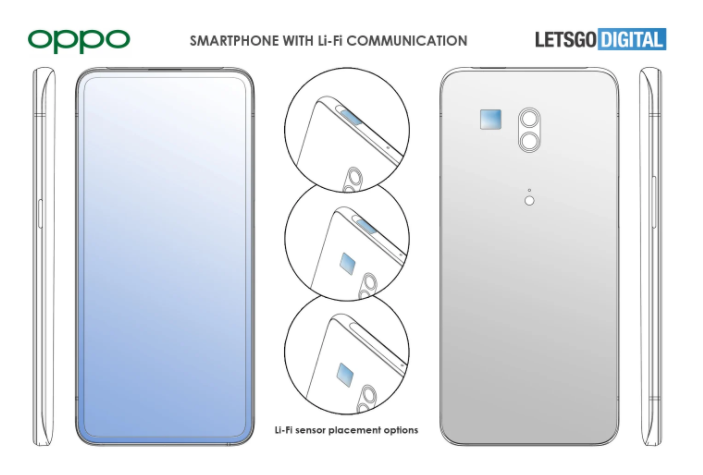Oppo patents a smartphone with Li-Fi technology

Sign up for breaking news, reviews, opinion, top tech deals, and more.
You are now subscribed
Your newsletter sign-up was successful
Wi-fi has become an integral part of smartphones and most Internet-connected gadgets these days. And deservedly so, as it’s fast, battery-efficient, and reliable. But what if there’s something faster and cheaper. Enter Li-Fi, a data-transmitting technology similar to Wi-Fi that uses LED light as a medium. And Oppo is taking the lead by patenting its first smartphone to feature the technology.
The patent, spotted by LetsGoDigital, shows images of the sensor placed on the Oppo smartphones. Unlike Wi-Fi, a Li-Fi module (a photodetector) is quite visible on the outside of the phone. This is required because the light photons need to be converted into currents. The images show the possible placements of the module. It is to be noted that this is just a patent at the time and, as with all patents, could never see the light of the day.

Li-Fi: Pros and Cons
Also, Li-Fi has its own pros and cons. For one, It is much faster than Wi-Fi, several times faster. It is capable of transmitting at 100Mbps, and in some cases, 10Gbps. Secondly, the frequency spectrum occupancy of Wi-Fi increases every day as it is the sole radio-waves medium besides LTE. Li-Fi can be used to cater to the growing demand for wireless data as it offers a much higher capacity for data transmission. It is also considered more energy-efficient as it uses LED light for data transmission and there are no interferences. The patent was published on July 31, 2020, and includes 24 product images, combined with a short description showing that this smartphone is suitable for Li-Fi communication.
As for cons, one of the biggest ones is its reliability on light, particularly LED bulbs. This means that a dark room with no LED light source would be cut off from the Internet. The next big con is its limited availability. Since light cannot penetrate walls, the limited range can be a nuisance for some people. For some, this can be good for security.
It’s also worth noting that Li-Fi itself isn’t new. It was demonstrated way back in 2012, however, it never got adopted as a mainstream technology. That might change if more smartphone makers hop onto the bandwagon.
Sign up for breaking news, reviews, opinion, top tech deals, and more.

Abdul Q is a Content editor at Techradar India. Formerly.